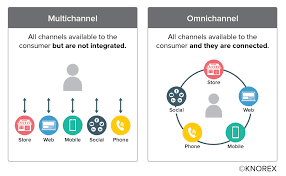The Power of Omni-Channel Marketing: Creating Seamless Customer Experiences
Omni-channel marketing is a strategy that focuses on creating a seamless and integrated experience for customers across multiple channels, both online and offline. In today’s digital age, where consumers interact with brands through various touchpoints, omni-channel marketing has become essential for businesses looking to engage and retain customers effectively.
One of the key benefits of omni-channel marketing is the ability to provide a consistent message and experience to customers regardless of the channel they choose to interact with. Whether it’s through social media, email, mobile apps, or in-store visits, a well-executed omni-channel strategy ensures that customers receive a cohesive brand experience at every touchpoint.
By leveraging data and analytics, businesses can gain valuable insights into customer behaviour and preferences across different channels. This information allows them to personalise their marketing efforts and tailor messages to individual customers, increasing the likelihood of conversion and loyalty.
Moreover, omni-channel marketing enables businesses to track customer journeys across channels, identifying pain points and opportunities for improvement. By understanding how customers move between online and offline channels, companies can optimise their strategies to provide a more seamless and convenient experience.
In conclusion, omni-channel marketing is not just a trend but a necessity in today’s competitive landscape. By embracing this approach and focusing on creating consistent, personalised experiences for customers, businesses can build stronger relationships, drive engagement, and ultimately achieve greater success in the digital world.
Six Essential Tips for Effective Omni-Channel Marketing
- Ensure consistency across all channels in terms of branding and messaging.
- Utilise data analytics to understand customer behaviour and preferences across different channels.
- Integrate online and offline channels to provide a seamless shopping experience for customers.
- Personalise interactions with customers based on their channel preferences and past interactions.
- Implement a cohesive strategy that aligns all channels towards common goals and objectives.
- Regularly monitor and evaluate the performance of each channel to make informed decisions for optimisation.
Ensure consistency across all channels in terms of branding and messaging.
To effectively implement omni-channel marketing, it is crucial to maintain consistency across all channels in terms of branding and messaging. By ensuring that the brand identity and message remain uniform regardless of whether a customer interacts through social media, email, or in-store visits, businesses can build trust and loyalty with their audience. Consistent branding helps reinforce brand recognition and fosters a seamless experience for customers as they move between different touchpoints. This approach not only strengthens the brand’s image but also enhances the overall customer journey, leading to increased engagement and conversion rates.
Utilise data analytics to understand customer behaviour and preferences across different channels.
By utilising data analytics to understand customer behaviour and preferences across various channels, businesses can gain valuable insights that enable them to personalise their marketing strategies effectively. This approach allows companies to track how customers interact with their brand, identify trends, and tailor messages to individual preferences. By leveraging data analytics in omni-channel marketing, businesses can enhance customer engagement, improve the overall customer experience, and drive better results across all touchpoints.
Integrate online and offline channels to provide a seamless shopping experience for customers.
By integrating online and offline channels, businesses can offer customers a seamless shopping experience that bridges the gap between the digital and physical worlds. This approach ensures that customers can easily transition between different touchpoints, such as browsing products online and making purchases in-store, creating a cohesive journey that enhances convenience and satisfaction. By unifying these channels, businesses can provide a holistic shopping experience that meets the evolving expectations of today’s consumers, ultimately driving engagement and loyalty.
Personalise interactions with customers based on their channel preferences and past interactions.
To excel in omni-channel marketing, it is crucial to personalise interactions with customers by tailoring messages and experiences according to their channel preferences and past interactions. By understanding how customers engage with different channels and leveraging insights from their previous interactions, businesses can create a more targeted and relevant approach that resonates with individual preferences. This personalised strategy not only enhances customer satisfaction but also strengthens brand loyalty by demonstrating a deep understanding of each customer’s unique needs and preferences.
Implement a cohesive strategy that aligns all channels towards common goals and objectives.
To succeed in omni-channel marketing, it is crucial to implement a cohesive strategy that aligns all channels towards common goals and objectives. By ensuring that every touchpoint, whether online or offline, works harmoniously towards the same end result, businesses can create a unified brand experience for customers. This approach not only strengthens brand consistency but also enables seamless transitions between channels, ultimately enhancing customer satisfaction and loyalty.
Regularly monitor and evaluate the performance of each channel to make informed decisions for optimisation.
Regularly monitoring and evaluating the performance of each channel is a crucial tip in omni-channel marketing. By analysing key metrics such as engagement, conversion rates, and customer feedback across various touchpoints, businesses can gain valuable insights into the effectiveness of their marketing efforts. This data-driven approach enables informed decision-making for optimisation, allowing companies to identify strengths and weaknesses in their strategy and make necessary adjustments to enhance the overall customer experience. Consistent evaluation ensures that businesses stay agile and responsive to changing market dynamics, ultimately leading to more successful omni-channel campaigns.

